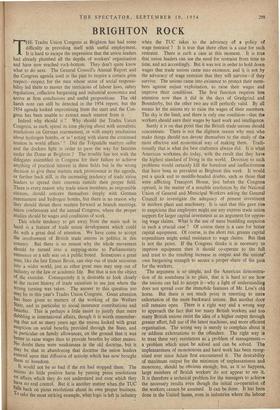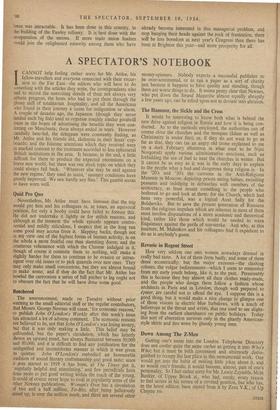BRIGHTON ROCK
THE Trades Union Congress at Brighton has had some difficulty in providing itself with useful employment. It is hard to escape the impression that the union leaders had already plumbed all the depths of workers' organisation and have now reached rock-bottom. They don't quite know what to do next. The General Council's Annual Report and the Congress agenda used in the past to inspire a certain grim respect—respect for the men whose sense of social responsi- bility led them to master the intricacies of labour laws, safety regulations, collective bargaining and industrial economics and arrive at firm conclusions and useful propositions. The old harsh note can still be detected in the 1954 report; but the 1954 agenda looked unpromising from the start and the Con- gress has been unable to extract much interest from it.
Indeed why should it ? Why should the Trades Union Congress, as such, spend its time playing about with unrealistic resolutions on German rearmament, or with empty resolutions about hydrogen bombs, or in 'noting with alarm the continued tension in world affairs''? Did the Tolpuddle martyrs suffer and the dockers fight in order to pave the way for fatuities under the Dome at Brighton ? The trouble lies not with the delegates assembled in Congress for their failure to achieve anything of practical interest in these fields but in the wrong decision to give these matters such prominence in the agenda, or further back still, in the increasing tendency of trade union leaders to spread their interests outside their proper field. There is every reason why trade union members, as responsible citizens, should concern themselves deeply with German rearmament and hydrogen bombs, but there is no reason why they should thrust these matters forward at branch meetings, union conferences and the annual Congress, where the proper studies should be wages and conditions of work.
This whole tendency to get away from the main task in and is a . feature of trade union development which could do with a great deal of attention. We have come to accept the involvement of British trade .unions in politics in this country. But there is no reason why the whole movement should be turned into a stepping-stone to Parliamentary eminence or a safe seat on a public board. Sometimes a great man, like the late Ernest Bevin, can step out of trade unionism into a wider world, just as other great men may step out of industry or the law or academic life. But that is not the object of the exercise. Consequently it is desirable to look closely at the recent history of trade unionism to see just where the Wrong turning was taken. The answer to this question too May lie in this year's Trades Union Congress. Great attention has been given to matters of the working of the Welfare State, and in particular to social insurance contributions and benefits. This is perhaps a little easier to justify than mere abbling in international affairs, though it is worth remember- ng that not so many years ago the unions looked with great suspicion on social benefits provided through the State, and in particular on family allowances, on the ground that' it was better to raise wages than to provide benefits by other means. No doubt there were weaknesses in the old doctrine, but it may be that in abandoning that doctrine the union leaders entered upon that diffusion of activity which has now brought them to boredom.
It would not be so bad if the rot had stopped there. The unions do little positive harm by passing pious resolutions nni affairs which they do not understand and over which they have no -real control. But it is another matter when .the TUC tails back on pious resolutions about its own proper business. 1.0 take the most striking example, what logic is left in industry when the TUC takes to the advocacy of a -policy of wage restraint ? It is true that there often is a case for such restraint. There is such a case at this moment. It is true that union leaders can see the need for restraint from time to time, and act accordingly. But it was not in order to hold down wages that trade unions came into existence, and it is not by the advocacy of wage restraint that they will survive—if they survive. The unions came into existence to protect their mem- bers against unjust exploitation, to raise their wages and improve their conditions. The first function requires less attention now than it did in the days of Gradgrind and Bounderby, but the other two are still perfectly valid. By all means let the unions try to raise the wages of their members. The sky is the limit, and there is only one condition—that the workers.should earn their wages by hard work and intelligence.
Surely it is on that point that the British trade unions should concentrate. There is not the slightest reason why men who make things should not devote themselves to the study of the most effective and economical way of making them. Tradi- tionally that is what the best craftsmen always did. It is what American workmen do today, with the result that they have the highest standard of living in the world. Devotion to such problems would certainly kill the boredom and ineffectiveness that have been so prevalent at Brighton this week. It would put a quick end to muddle-headed doubts, such as those that were afflicting Transport House, just before the Congress opened, in the matter of a sensible resolution by the National Union of General and Municipal Workers asking the General Council to investigate the adequacy of present investment in modern plant and machinery. It is said that this gave rise to suspicions that employers might use any express trade union support for larger capital investment as an argument for oppos- ing wage claims. What is the use of mere bumbling suspicion in such a crucial case ? Of course there is a case for better capital equipment. Of course, in the short run, greater capital expenditure might entail resistance to wage claims. But that is not the point. If the Congress thinks it is necessary to improve equipment then it should co-operate to the full and trust to the resulting increase in output and the unions' own bargaining strength to secure a. proper -share of the gain for the workers.
The argument is so simple, and the American demonstra- tion of its soundness is so plain, that it is hard to' see how the unions can fail to accept it—why a light of understanding does not spread over the immobile features of Mr. Low's old horse. But there is not much point in resorting to mere exhortation of the more backward unions. But another door still remains open. There is a right way and a wrong way to approach the fact that too many British workers and too many British unions resist the idea of a higher output through greater effort, full use of the latest machines, and more efficient organisation. The wrong way is merely to complain about it or address exhortations to the offenders. The right way is to treat these very resistances as a problem of management—. a problem which must be solved and can be solved. The unpleasantness of monotonous and hard work has been recog- nised ever since Adam first encountered it. The desirability of maximum output for the minimum of unpleasantness and monotony, should be obvious enough; but, as it so happens, large numbers of British workers' do not appear to see it. It is therefore a technical problein .for the managers to achieve the necessary results even though the initial co-operation of the workers cannot be assumed. It can be done. It has been done in the United States, even in industries where the labour `orce was intractable. It has been done in this country, in .he building of the Fawley refinery. It is best done with the :0-operation of the unions. If more trade union leaders vould join the enlightened minority among them who have already become interested in this managerial problem, and stop banging their heads against the rock of frustration, there will be less boredom at next year's Congress than there has been at Brighton this year—and more prosperity for all.



































 Previous page
Previous page